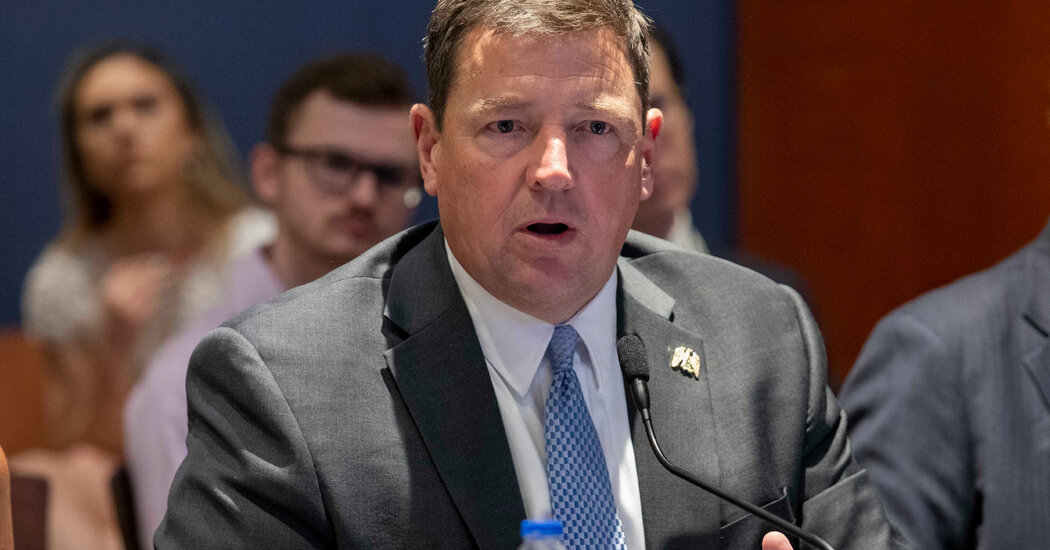President Trump has kept up a steady bombardment of suggestions, requests and demands to arrest, investigate or prosecute targets of his choosing — the former F.B.I. director James B. Comey, sundry Democrats, officials who refuted his election lies, Beyoncé, the Boss.
But Mr. Trump’s directives have so far hit a stubborn snag. Few, if any, of those singled out have done anything to invite conventional prosecutorial scrutiny, much less committed prosecutable crimes to warrant an indictment under federal law.
But a Trump loyalist, given new, vague and possibly vast power, has found a workaround.
In recent days, Ed Martin, the Justice Department’s incoming “weaponization czar,” made a candid if unsurprising admission: He plans to use his authority to expose and discredit those he believes to be guilty, even if he cannot find sufficient evidence to prosecute them — weaponizing an institution he has been hired to de-weaponize, in the view of critics.
“If they can be charged, we’ll charge them,” Mr. Martin told reporters before stepping down as interim U.S. attorney in Washington. “But if they can’t be charged, we will name them. And we will name them, and in a culture that respects shame, they should be people that are ashamed.”
He added, “That’s the way things work.”
That is not the way things have worked. The cardinal rule of prosecutors is to speak only through evidence and court filings. The department is supposed to abide by the dictum of charging crimes, not people. Naming and shaming is antithetical to its mission of pursuing justice impartially. And Mr. Martin’s statement appears to violate the department’s ethical and procedural rule book, which mandates “fair, evenhanded” investigations to safeguard “the privacy and reputation interests of uncharged” investigative targets.
“Outside of cases where you have someone whose conduct is open and notorious, the idea of targeting individuals is antithetical to the notion of the government investigating crimes, not people,” said Daniel C. Richman, a law professor at Columbia and a former federal prosecutor.
“And the person who will be picking out those people has no record of the prudential exercise of judgment in federal prosecutions, but in fact has a record of abusive invocations of government power,” he added.
Since taking office, Mr. Trump has blurred, and at times obliterated, the line between personal score-settling and running a country — threatening law firms that harbor his opponents and using executive orders to punish or intimidate individuals and institutions, often using the threat of Justice Department action as leverage to extract concessions.
Mr. Martin, a cheerful but obdurate activist from Missouri, has often out-Trumped the Trump team. In his brief stint as U.S. attorney, he thrust himself into national politics by leveling threats against Democrats and academic institutions. His subordinates quietly urged him to pump the brakes — and had to stop him from indicting the Democratic leader, Senator Chuck Schumer of New York, for making a vague threat at Supreme Court justices five years ago.
Some of Mr. Martin’s inquiries proceeded. One of them was an investigation into another New York antagonist of Mr. Trump’s, Andrew Cuomo, over congressional testimony about his response as governor to the coronavirus pandemic.
Nonetheless, it has all been a bit too much for many in his own party. Earlier this month, Republican senators blocked Mr. Martin’s nomination to permanently run the U.S. attorney’s office. In recompense, he was given control over the department’s pardon office and the weaponization group with authority to pursue Mr. Trump’s onetime investigators, including Jack Smith, the special counsel who indicted him twice.
Mr. Martin has virtually no investigative experience. Instead he has signaled he intends to subject the president’s accusers to humiliations and inconveniences comparable to what Mr. Trump endured, to right perceived wrongs.
“They tried to bankrupt him, they tried to put him in prison for life for non-crimes, they tried to get him off the ballot,” said Mike Davis, a Republican and former Senate Judiciary Committee aide with close ties to the Trump White House. “They must be held accountable for this criminal conspiracy.”
Mr. Trump and his team said they are rebuilding, not destroying, the department.
“Unfortunately in recent years, a corrupt group of hacks and radicals within the ranks of the American government obliterated the trust and good will built up over generations,” Mr. Trump told an audience of supporters at the department in March.
Yet there is a hollowness in the president’s effort to spin a vengeance trip as a path back to normalcy. It is undercut by calls to prosecute opponents that began with “Lock Her Up” chants about Hillary Clinton in 2016 and now encompass a breathtaking range of targets.
On April 9, Mr. Trump ordered the investigation of Miles Taylor, a former official who had criticized him anonymously. On the same day, he directed Attorney General Pam Bondi to open an inquiry into Chris Krebs, a former cybersecurity official who refuted Mr. Trump’s false claim that the 2020 election was stolen from him.
Mr. Trump then ordered an investigation of ActBlue, a Democratic fund-raising platform. That was followed this month by higher-profile, if less formal, accusations on social media against liberal entertainers — including Beyoncé, Bruce Springsteen and Oprah Winfrey — for accepting fees to perform at Kamala Harris’s campaign events.
His appointees have followed suit. Richard Grenell, installed as the president of the Kennedy Center, recently called for a criminal investigation into the organization’s finances.
The Justice Department has declined to comment on the referrals.
But the threat of action is real, and the department has not been shy about opening investigations or arresting politicians and judges, including the Democratic mayor of Newark over a trespassing charge and a Wisconsin judge accused of shielding an immigrant from federal agents.
The administration has also dropped cases against Trump allies, most notably Mayor Eric Adams of New York, and pardoned Capitol rioters whose convictions were buttressed by evidence. At the same time, it has at the same time decimated units responsible for prosecuting white-collar and public corruption cases. That, combined with an energetic focus on vendettas, might create a vacuum of enforcement of real and provable crimes, according to former officials.
It is a sharp turnabout from his first term, when Mr. Trump accused the Justice Department of violating the protective norms by disclosing details of investigations into his conduct to harm him. It was his main justification for firing Mr. Comey in 2017, after the F.B.I. director publicly acknowledged that he was investigating the Trump campaign’s interactions with Russia.
Last week, Mr. Comey returned to center stage after posting an image of seashells arrayed on a beach to read “86 47.” Mr. Trump prodded Ms. Bondi to investigate the quickly deleted post as an assassination threat.
“That is going to be up to Pam,” the president told Fox News, adding, “If he had a clean history I could understand if there was a leniency, but I’m going to let them make that decision.”
It remains to be seen if Mr. Martin will be given full control over the weaponization initiative. Some administration aides think he talks too much and would better serve Mr. Trump by backing off, according to officials with knowledge of their dynamic.
But Mr. Martin, already the subject of investigation into his conduct as U.S. attorney, appears set on his course.
During a recent interview with Tucker Carlson, he mentioned that a whistle-blower informed him that Samantha Power, the former U.S. ambassador to the United Nations, had given money to political parties to sway elections in another country. He offered no evidence.
“The question is, are we going to get all of it, name it and then hold some people accountable?” Mr. Martin said. “People say, ‘Are you going to walk people out in cuffs?’ Right now, I’d be happy to just have people know their names.”
At another point, Mr. Martin said he viewed himself as being engaged in a “war over information.” He cited a letter he had written to Wikipedia accusing it of bias and improperly shielding itself from scrutiny through its tax-exempt status.
He never suggested that Wikipedia had broken the law. He indicated that his letter was to air his view of their actions in the public arena.
“A prosecutor saying that about Wikipedia is vastly different than Tucker Carlson saying it,” Mr. Martin said. “And that’s the point of the job.”
The role of a prosecutor, he claimed, “is not just to find the right guy to prosecute” but to publicize their purported wrongdoing in public.
In a landmark 1940 speech, a top Justice Department official offered another vision.
Robert H. Jackson, then the attorney general, told department employees that the “greatest danger of abuse of prosecuting power” was when an official “finds some person whom he dislikes or desires to embarrass, or selects some group of unpopular persons and then looks for an offense.”
Glenn Thrush covers the Department of Justice for The Times and has also written about gun violence, civil rights and conditions in the country’s jails and prisons.
Alan Feuer covers extremism and political violence for The Times, focusing on the criminal cases involving the Jan. 6 attack on the Capitol and against former President Donald J. Trump.
The post If We Can’t Prosecute Trump’s Foes, We’ll ‘Shame’ Them, Justice Dept. Official Says appeared first on New York Times.




